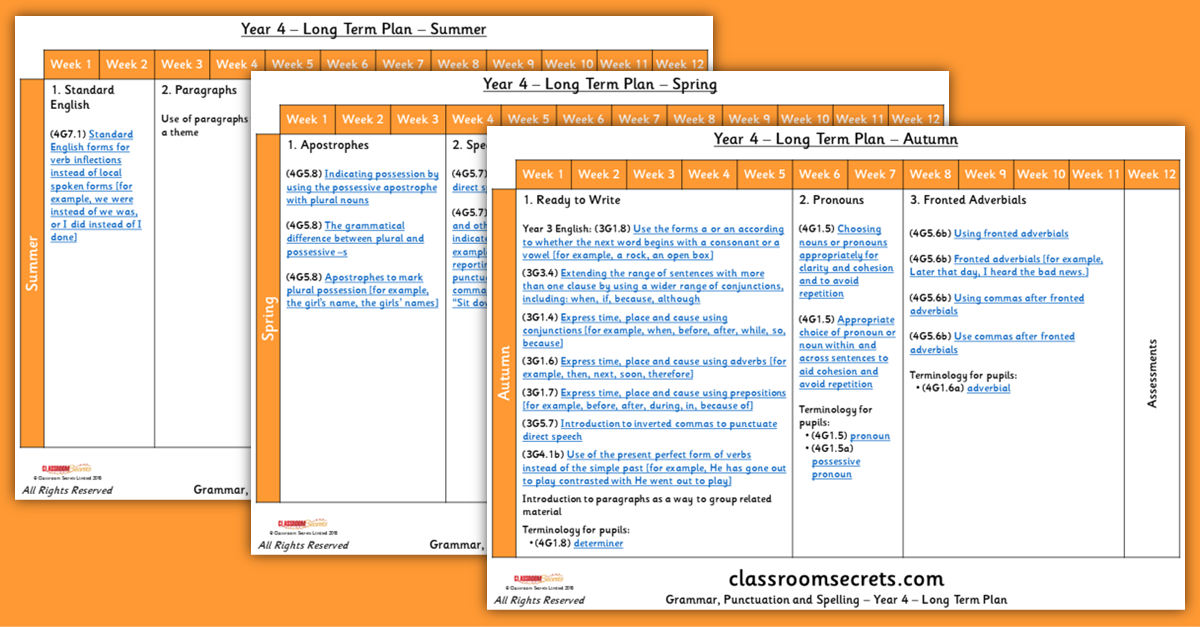Free Year 4 GPS Long Term Plan with Objectives

Free Year 4 GPS Long Term Plan with Objectives
Year 4 GPS Long Term Plan which includes the Grammar, Vocabulary and Punctuation objectives from the National Curriculum. This document maps out each block across the year and when the objectives will be taught.
What's included in the pack?
This pack includes:
- Year 4 GPS Long Term Plan with Objectives
National Curriculum Objectives
Year 4 – Long Term Plan – Autumn
Year 3 English:
(3G1.8) Use the forms a or an according to whether the next word begins with a consonant or a vowel [for example, a rock, an open box]
(3G3.4) Extending the range of sentences with more than one clause by using a wider range of conjunctions, including: when, if, because, although
(3G1.4) Express time, place and cause using conjunctions [for example, when, before, after, while, so, because]
(3G1.6) Express time, place and cause using adverbs [for example, then, next, soon, therefore]
(3G1.7) Express time, place and cause using prepositions [for example, before, after, during, in, because of]
(3G5.7) Introduction to inverted commas to punctuate direct speech
(3G4.1b) Use of the present perfect form of verbs instead of the simple past [for example, He has gone out to play contrasted with He went out to play]
(4G1.5) Choosing nouns or pronouns appropriately for clarity and cohesion and to avoid repetition
(4G1.5) Appropriate choice of pronoun or noun within and across sentences to aid cohesion and avoid repetition
(4G5.6b) Using fronted adverbials
(4G5.6b) Fronted adverbials [for example, Later that day, I heard the bad news.]
(4G5.6b) Using commas after fronted adverbials
(4G5.6b) Use commas after fronted adverbials
Year 4 – Long Term Plan – Spring
(4G1.5) Appropriate choice of pronoun or noun within and across sentences to aid cohesion and avoid repetition
(4G5.7) Use of inverted commas and other punctuation to indicate direct speech [for example, a comma after the reporting clause; end punctuation within inverted commas: The conductor shouted, “Sit down!”]
(4G5.8) Apostrophes to mark plural possession [for example, the girl’s name, the girls’ names]
(4G5.6b) Use commas after fronted adverbials
(4G5.7) Using and punctuating direct speech
(4G5.7) Use of inverted commas and other punctuation to indicate direct speech [for example, a comma after the reporting clause; end punctuation within inverted commas: The conductor shouted, “Sit down!”]
(4G3.2) Noun phrases expanded by the addition of modifying adjectives, nouns and preposition phrases (e.g. the teacher expanded to: the strict maths teacher with curly hair)
(3G6.4) Word families based on common words, showing how words are related in form and meaning [for example, solve, solution, solver, dissolve, insoluble]
Year 4 – Long Term Plan – Summer
- Terminology for pupils:
- (4G1.8) determiner
- (4G1.5) pronoun
- (4G1.5a) possessive pronoun
- (4G1.6a) adverbial
This resource is available to download with a Taster subscription.





